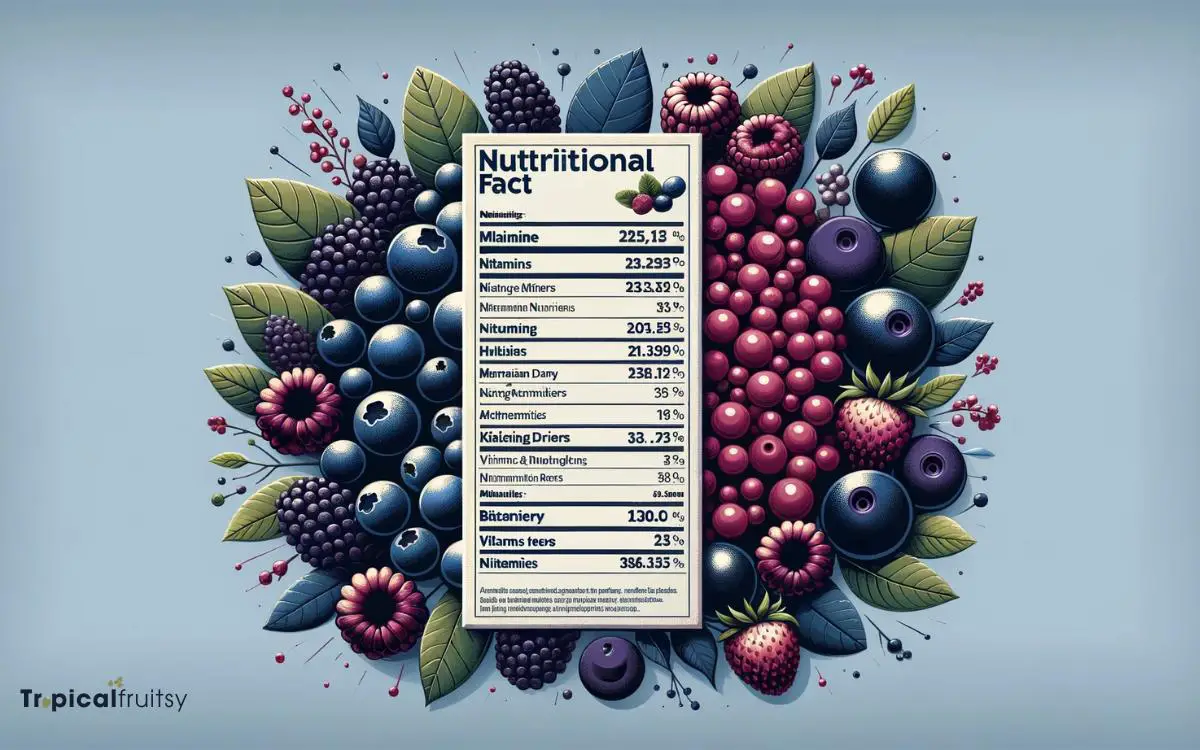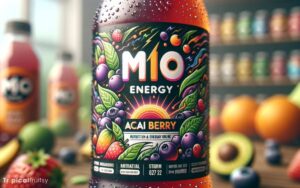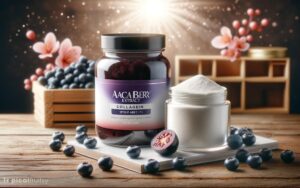Acai Berry Vs Maqui Berry: Unleash the Ultimate Battle!
Acai and Maqui berries are both South American superfruits renowned for their health benefits, particularly their high antioxidant content.
Acai berries come from the Amazon rainforest, while Maqui berries are indigenous to the Patagonian region of Chile.
Both are celebrated for aiding in the fight against oxidative stress, but they differ in their specific nutritional values, health benefits, culinary uses, availability, and cost.
Acai berries are often found in smoothie bowls and supplements, prized for their rich flavor and health perks, such as heart and skin health improvement.
Maqui berries, with a slightly tart taste, are less common but are gaining traction for their potential to support weight management and control blood sugar levels.
Antioxidant levels in these berries are measured by the Oxygen Radical Absorbance Capacity (ORAC) score, where both score highly but Maqui has a higher rating.
Discover the unique properties of Acai and Maqui berries to enhance your diet and boost your wellness journey.

Key Takeaway
Acai Berry vs. Maqui Berry: A Nutritional Comparison
| Nutrient | Acai Berry | Maqui Berry |
|---|---|---|
| Origin | Amazon Rainforest | Patagonian Region, Chile |
| Antioxidant Capacity | High (Lower ORAC score) | Very High (Higher ORAC score) |
| Health Benefits | Heart health, skin health | Weight management, blood sugar control |
| Culinary Uses | Smoothies, bowls | Juices, supplements |
| Availability | Widely available | Less common |
| Price Point | Moderate to high | Moderate to high |
| Side Effects | Minimal | Minimal |
Origins and History
The acai berry originates from the rainforests of the Amazon basin in South America. The maqui berry, on the other hand, is native to the Valdivian temperate rainforests of Chile and adjacent regions of southern Argentina.

Historically, both of these berries have been integral to the diets and cultures of the indigenous populations.
The acai palm was cultivated for its fruit and other uses, and the maqui has been celebrated for its healing properties.
Scientific analysis confirms that these berries are not only steeped in tradition but also possess significant health benefits.
Their respective origins contribute to unique compositions that have garnered attention in the health foods market globally.
Understanding the nutritional profile of each berry will shed light on why they have become such sought-after superfoods.
Nutritional Profile
Acai berries boast a rich nutritional profile, high in antioxidants, fiber, and heart-healthy fats, whereas maqui berries are distinguished by their exceptional concentration of anthocyanins and vitamin C content.
Both berries contain valuable nutrients, but they offer different benefits based on their unique compositions.

Acai berries provide an ample amount of monounsaturated fats, similar to those found in olive oil, which can support cardiovascular health. They also contain fiber which aids in digestive health.
On the other hand, maqui berries exhibit a potent level of anthocyanins, compounds known for their anti-inflammatory and anti-carcinogenic properties, surpassing even that of acai. Moreover, the high vitamin C content in maqui berries contributes to immune system health and skin repair.
When comparing their nutritional profiles, it’s clear that both berries offer substantial health benefits, albeit through varied nutrient concentrations.
Acai Berry vs. Maqui Berry: A Nutritional Comparison
| Nutrient | Acai Berry | Maqui Berry |
|---|---|---|
| Origin | Amazon Rainforest | Patagonian Region, Chile |
| Antioxidant Capacity | High (Lower ORAC score) | Very High (Higher ORAC score) |
| Health Benefits | Heart health, skin health | Weight management, blood sugar control |
| Culinary Uses | Smoothies, bowls | Juices, supplements |
| Availability | Widely available | Less common |
| Price Point | Moderate to high | Moderate to high |
| Side Effects | Minimal | Minimal |
Antioxidant Power
When comparing the antioxidant capacity of acai and maqui berries, the ORAC (Oxygen Radical Absorbance Capacity) value serves as a critical metric for assessment.
Research has linked high ORAC value foods to potential anti-aging benefits, due to their ability to neutralize free radicals associated with oxidative stress.

Additionally, both berries have been studied for their potential to reduce inflammation, a marker related to chronic diseases and aging.
ORAC Value Comparison
Consistently, maqui berries have demonstrated a higher Oxygen Radical Absorbance Capacity (ORAC) value than acai berries, reflecting their potent antioxidant potential.
This ORAC value is a metric used to quantify the total antioxidant capacity of foods and supplements, providing a comparative insight into their ability to combat oxidative stress.
ORAC Value Insights:
Maqui Berry:
- Often ranks significantly higher in ORAC scores compared to other superfruits.
- Suggests superior capacity to neutralize free radicals.
Acai Berry:
- Exhibits a commendable ORAC score, albeit lower than maqui.
- Still recognized for substantial antioxidative benefits.
- Comparative Context:
- Both berries contribute to antioxidant intake, but maqui may offer an edge in neutralizing specific oxidative agents.
This analytical comparison sets the stage for exploring how these antioxidant properties may translate into anti-aging benefits in the subsequent section.
Anti-Aging Benefits
- Maqui berries are potent antioxidants that can help protect cells from oxidative damage, potentially slowing down the aging process.
- Antioxidants in maqui and acai berries neutralize free radicals, which can cause cellular deterioration and premature aging.
- Maqui berries are particularly rich in anthocyanins, known for their strong anti-aging effects.
- Acai berries, containing vitamins A, C, and E, promote skin health, stimulate regeneration, and reduce the appearance of wrinkles.
- The unique phytochemical compositions of maqui and acai berries may target different aspects of aging, making them complementary choices for natural anti-aging solutions.
Inflammation Reduction Potential
Harnessing the robust antioxidant capabilities of acai and maqui berries may offer significant inflammation reduction potential, pivotal in mitigating chronic diseases and promoting overall wellness.
Both berries contain high levels of anthocyanins and polyphenols, which are known for their anti-inflammatory properties.
Acai Berries:
- Rich in anthocyanins, which help combat oxidative stress.
- Contain omega-9 and omega-6 fatty acids that may reduce inflammation.
- Studies suggest acai has potential to hinder molecules linked to inflammation.
Maqui Berries:
- Higher antioxidant levels per serving compared to acai.
- Possess a unique compound called delphinidins, contributing to their anti-inflammatory effects.
- Research indicates maqui may suppress the production of inflammatory cytokines.
This evidence-based analysis underscores the need for further comparative studies. Next, we will delve into the nuanced ‘health benefits compared’ between these two superfruits.
Health Benefits Compared
When comparing the health benefits of acai and maqui berries, it is essential to scrutinize the empirical evidence underpinning their respective contributions to wellness.
Studies suggest that both berries possess significant antioxidant capacities, although the precise comparative efficacy in neutralizing free radicals remains a topic of ongoing research.

Additionally, the potential of each berry to influence weight loss has garnered attention, with preliminary findings indicating possible metabolic impacts. This necessitates further investigation to substantiate these effects.
Antioxidant Power Matchup
| Property | Acai Berries | Maqui Berries |
|---|---|---|
| Antioxidant Capacity | Remarkable antioxidant capacity | Remarkable antioxidant capacity |
| Key Antioxidants | High levels of polyphenols | High levels of certain anthocyanins |
| Antioxidant Effects | Protects against cellular damage | Provides enhanced defense against oxidation |
| Cardiovascular Health | May help lower bad cholesterol levels | Might improve blood sugar and lipid profiles |
| Anti-Aging Benefits | Promotes skin health through bioactive compounds | Delays aging markers by combating free radicals |
Please note that: the specific health benefits of these berries can vary based on individual factors and overall dietary choices.
Research indicates both berries exhibit substantial antioxidant activity, though maqui may edge out acai in certain measures.
As we consider these health benefits, it’s worth examining how these superfruits might influence weight loss efforts.
Weight Loss Effects
While both acai and maqui berries are celebrated for their antioxidant properties, they also show promise in supporting weight loss through distinct biological mechanisms.
The consumption of these berries has been associated with beneficial effects on metabolism, reduction in fat absorption, and influence on genes related to fat metabolism.
| Aspect | Acai Berry | Maqui Berry |
|---|---|---|
| Fiber Content | High; helps promote satiety | Comparatively lower but still significant |
| Metabolic Enhancement | Contains compounds that boost metabolism and increase fat oxidation | Antioxidants may improve insulin sensitivity, aiding in weight management |
| Fat Absorption | Anthocyanins may reduce fat absorption | Limited evidence on direct effects |
| Gene Influence | Can activate genes related to fat breakdown | Effects on genes require more research |
Evidence suggests that integrating these berries into a balanced diet may supplement weight loss efforts, but they should not be considered miracle solutions.
For individuals seeking to harness the health benefits of these berries, further research and consultation with healthcare professionals are advised.
Culinary Uses
In the realm of culinary applications, both acai and maqui berries are celebrated for their versatility and vibrant contribution to food and beverages.

These antioxidant-rich superfruits not only add nutritional value but also a burst of color and flavor.
Here’s a standard table summarizing the uses of Acai and Maqui berries:
| Uses | Acai Berries | Maqui Berries |
|---|---|---|
| Bowls | Frozen pulp blended with fruits, granola, and banana | Not commonly used in bowls |
| Smoothies | Blended with other berries for nutritious drinks | Not commonly used in smoothies |
| Desserts | Incorporated into ice creams, sorbets, and truffles | Not commonly used in desserts |
| Juices and Teas | Not commonly used in juices and teas | Brewed to create healthful drinks |
| Jams and Sauces | Not commonly used in jams and sauces | Cooked down to enhance sweet and savory dishes |
| Baking | Not commonly used in baking | Dried and powdered form used in muffins and cakes |
Please note that: the uses of these berries can vary depending on regional culinary traditions and personal preferences.
Culinary professionals and enthusiasts alike appreciate these berries for their dynamic uses and healthful properties.
Accessibility and Price

Acai berries have gained significant popularity internationally, especially in health food circles, which has led to widespread availability.
They can be found in various forms, from frozen pulp to dried powder, in many health food stores and supermarkets.
Consequently, the increased demand and established supply chains have made the pricing of acai competitive, though still relatively high due to their perceived health benefits.
In contrast, maqui berries are less commercialized and primarily found in specialty stores or through online retailers.
Their limited production and export from their native regions in South America often result in a higher price tag when compared to acai.
This scarcity impacts their accessibility, making them a more exclusive and sometimes more expensive superfood option.
Potential Side Effects

Although both acai and maqui berries are celebrated for their health benefits, consumers should be aware of their potential side effects.
These side effects are generally rare and often associated with overconsumption or pre-existing conditions:
Acai Berries:
- Allergic Reactions: Individuals with allergies to pollen or other berries may experience similar reactions.
- Interaction with Medication: Acai might affect the metabolism of certain drugs.
- High Caloric Intakes: Excessive consumption can lead to weight gain due to high calorie content.
Maqui Berries:
- Limited Research: Less is known about maqui, which calls for caution.
- Detoxification Effects: May cause mild digestive discomfort as the body detoxifies.
- Blood Sugar Impact: Diabetics should monitor their blood sugar levels as maqui can influence glucose regulation.
In both cases, moderation is key, and consulting with a healthcare provider is advisable for individuals with health concerns or those taking prescription medications.
Which Berry Comes Out on Top in the Battle of Health Benefits – Acai, Maqui, or Aronia?
In the aronia vs acai berries showdown, it’s a tight race for the top spot in health benefits. Acai berries are known for their high antioxidant content, while maqui berries boast anti-inflammatory properties. Aronia berries, on the other hand, are hailed for their impressive vitamin and mineral profile.
Which is the Superior Berry: Acai or Aronia?
When it comes to the aronia berry and acai berry comparison, both have their own unique nutritional benefits. The acai berry is known for its high antioxidant content and potential anti-inflammatory properties. On the other hand, the aronia berry is rich in vitamins and minerals, making it a superior option for overall health.
Making the Right Choice
Selecting between acai and maqui berries ultimately depends on individual health goals and dietary preferences.

Both berries offer unique health benefits, but it’s imperative to analyze their nutritional profiles, potential health impacts, and how they fit into your specific dietary needs.
Below is a comparison table highlighting key aspects to consider:
| Aspect | Acai Berry | Maqui Berry |
|---|---|---|
| Antioxidant Content | High in anthocyanins | Extremely high in delphinidins |
| Origin | Amazon rainforest | Chilean rainforests |
| Taste | Earthy, rich | Slightly tart, sweet |
| Popular Use | Bowls, smoothies | Supplements, juices |
| Research | More extensive | Emerging studies |
Evaluating these factors through an analytical lens will better inform your choice. Both berries boast impressive health benefits, but personal goals such as weight management, disease prevention, or energy levels could sway your decision toward one over the other.
Conclusion
Both acai and maqui berries boast remarkable nutritional profiles with significant antioxidant capacities, offering a range of health benefits.
The choice between the two may hinge on specific dietary needs, culinary preferences, and accessibility. While acai has gained global recognition, maqui remains a lesser-known gem.
Consumers should weigh the subtle differences in benefits, culinary versatility, and market availability to decide which berry best aligns with their health objectives and lifestyle considerations.






